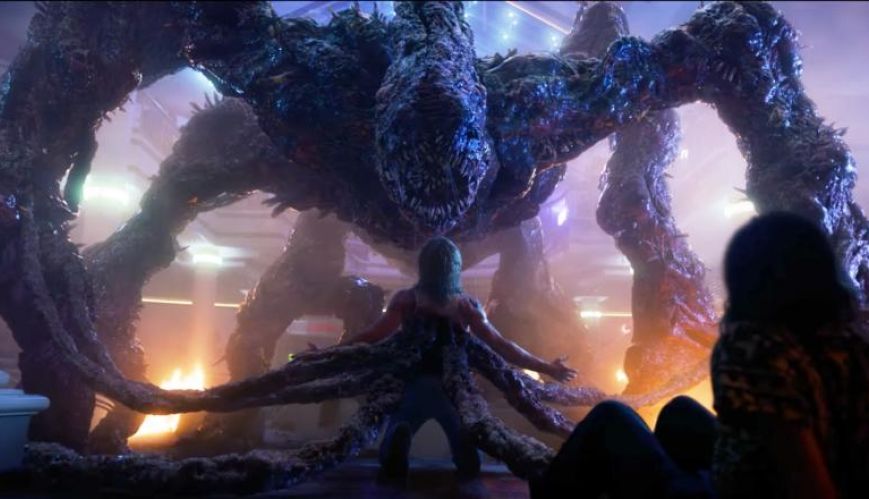TV series review: Stranger Things Season 3

TV series review: Stranger Things Season 3
17 August 2019
Stranger Things is not the first series, or film for that matter, to build an audience around the idea that there is a malevolent force out there that would like nothing better than to see us inhabit a hell on earth.
As a society, we don’t believe in hell anymore … except when we do.
The answer to this conundrum resides in your television set. Australians who’ve given up on anything remotely resembling a world for the damned are sitting down to contemplate just that in the wildly popular series Stranger Things. And the not-so-strange thing they’re united on is they don’t want to go there.
Stranger Things launched in 2016 as ‘the little series that could’. It was a quirky, quasi-science fiction tale about weird things happening in small-town America. 
It faced many similar competitors but had two things going for it. Firstly, it starred Winona Ryder, a troubled actress many viewers grew up loving in a slew of 90s box-office hits. Secondly, its creators Matt and Ross Duffer had managed to bottle the 1980s nostalgia that characterises ‘kids versus the world’ films like The Goonies and Stand By Me – which explains why adults are fascinated with a series mostly focused on a group of teens.
In the first season, viewers were introduced to Will Byers, a young boy who disappears riding home from a night of Dungeons and Dragons with his friends. Not content to sit idly by, his nerdy friends Mike, Dustin and Lucas set out on their bikes to solve the mystery. What they slowly uncover is a government conspiracy to breed gifted children capable of breaking into an alternate dimension referred to as ‘The Upside Down’. With the help of a psychokinetic girl called Eleven, this ragtag bunch eventually rescues Will, but not before realising this alternate dimension is about as close to hell as any person might want to come.
The second season builds on the first, introducing the horrific creature at the heart of The Upside Down, nicknamed the Mind Flayer. It is a sentient evil that corrupts everything it touches, and is bent on breaking into our world. Just when you think it’s finally been defeated, along comes season three to assure you the devil is not so easily locked away. This time Will and his friends have to deal with an army of damned figures the Mind Flayer has co-opted for his plan to destroy all life.
Film and TV fantasies are to society what your dreams are to your state of mind. It’s no big surprise that people have been known to have nightmares about leaving the house without their pants the night before a big exam. The brain takes our fears and translates them into startling visual illustrations. Likewise, writers and producers find fertile ground in topics in which society is publicly uninterested, but privately enthralled. Stranger Things is not the first series, or film for that matter, to build an audience around the idea that there is a malevolent force out there that would like nothing better than to see us inhabit a hell on earth.
The Bible, on the other hand, has no trouble attesting to the existence of a personal devil hungry for prey: “Be alert and of sober mind. Your enemy the devil prowls around like a roaring lion looking for someone to devour” (1 Peter 5:8).
So why should such a determined adversary be invisible to the world around us? In his book, Screwtape Letters, C.S. Lewis suggests that in our materialist age, the devil and his minions’ tactics are to suggest that nothing spiritual exists, including God and themselves. But programs like Stranger Things reveal our deeper selves remain unconvinced.
I don’t believe it was the creators’ intention, but their characters suggest the fearful things the Bible describes in detail: “This thing that took your son ... we don’t really understand it. But its behaviour is predictable. Like all animals, it eats. It will take more sons. More daughters.”
Interestingly, characters from the first two seasons of Stranger Things suggested lying was the best way to keep people safe. In the recently released third, though, telling the truth is presented as the only way forward. If that were the case, maybe it would be more effective for Christians to be honest with unbelievers about what it is that crouches at the bottom of their fears. Then maybe the victory Jesus has won over sin, death and the devil will shine all the brighter.
Stranger Things is rated MA15+ and is showing on Netflix.
Mark Hadley is the culture writer for Others and is one of Australia's leading Christian communicators.
Comments
No comments yet - be the first.